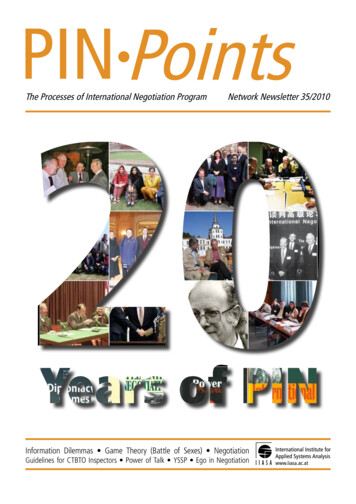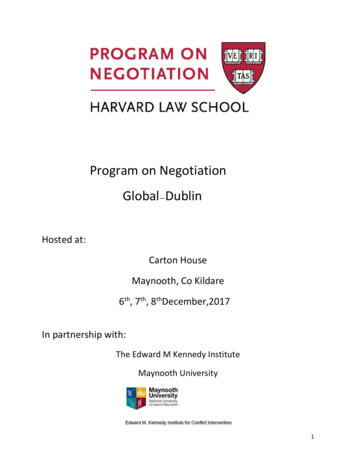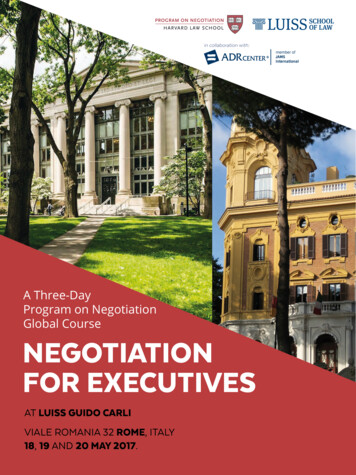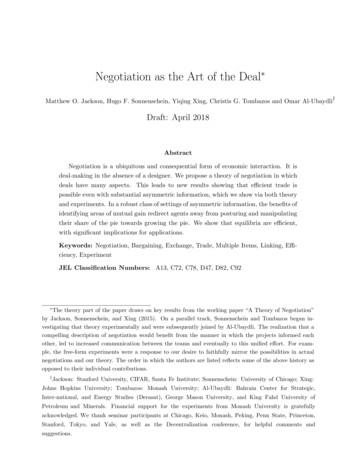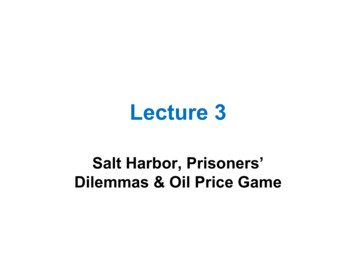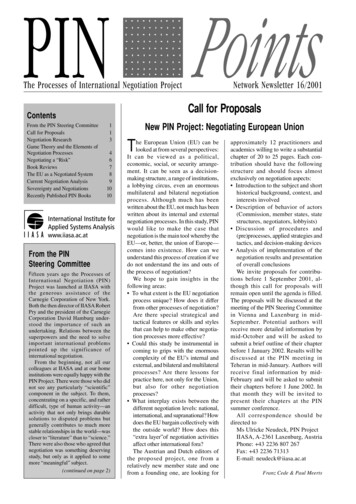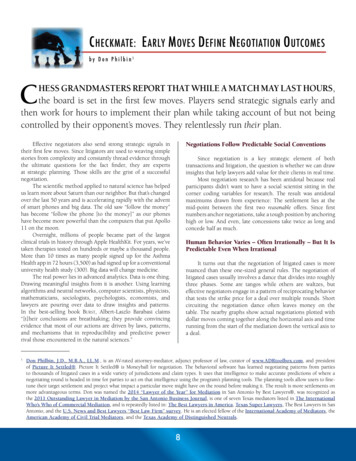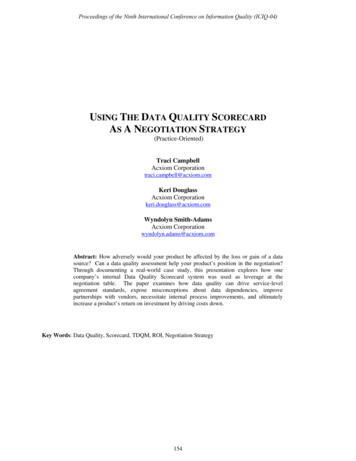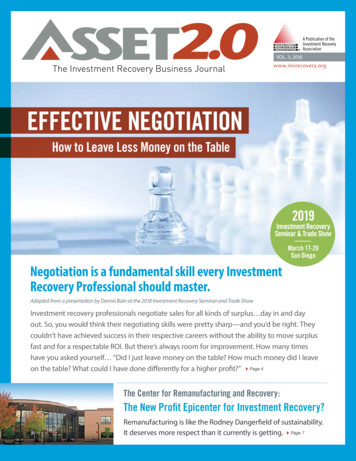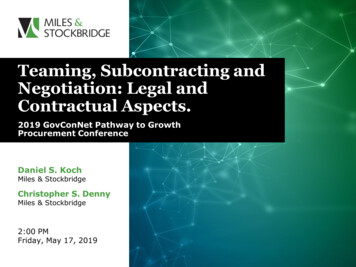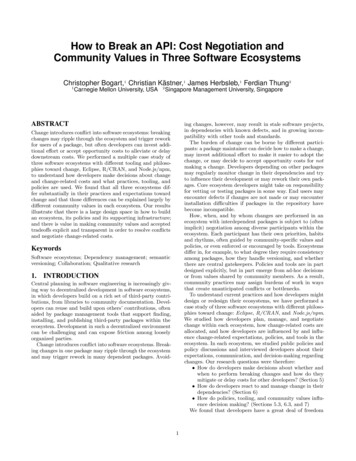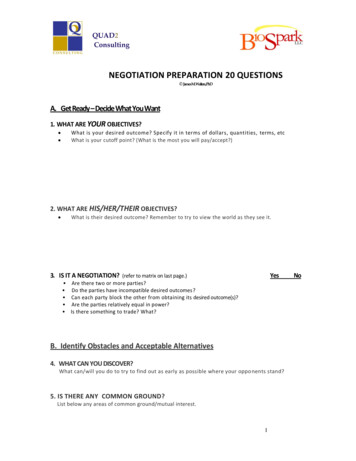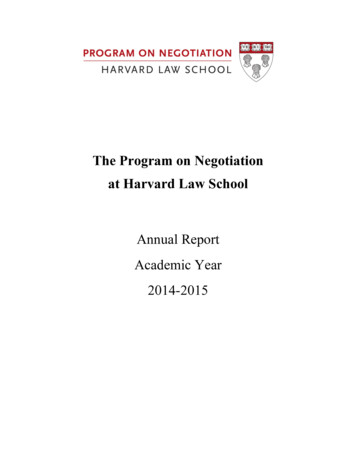
Transcription
The Program on Negotiationat Harvard Law SchoolAnnual ReportAcademic Year2014-2015
PON Annual Report IndexPart One: Report of ActivitiesA. Summary of Academic Year 2014-20151. Executive Summary2. Research, Scholarship and Project Activitiesa. Areas of Inquiry – Research Program’s Mission Statementb. Projects / Research & Scholarshipi.Harvard Negotiation Research Projectii.Harvard Negotiation Project1. The Harvard International Negotiation Program2. The Global Negotiation Initiativeiii.American Secretaries of State Projectiv.The Middle East Negotiation Initiative (MENI)v. MIT-Harvard Public Disputes Programvi.Program on Negotiations in the Workplacevii.PON Research Seminarviii.Leadership and Negotiationc. Clinical Workd. Publications and Other Activitiesi.Publications1. Negotiation Journal2. Negotiation Briefings3. Harvard Negotiation Law Review4. Teaching Negotiation5. Books published by PON-affiliated faculty in 20142015ii.Conferencesiii.Workshopsiv.Events1. American Secretaries of State Project2. The Herbert C. Kelman Seminar Series on Negotiation,Conflict and the News Media3. Middle East Negotiation Initiative4. PON Lunchtime Talks5. PON Film Series6. Other Eventse. Fellows, Visiting Researchers, Research Assistants and Internsi.2014-2015 Visiting Scholars and Researchersii.2014-2015 PON Graduate Research Fellows
iii.PON Summer Research Fellowship Programiv.Student Teaching and Research Assistantsv. 2014-2015 PON Interns and Student Assistants3. Teaching (Contributions to HLS Teaching Program)a. Courses at Harvard Law Schoolb. Teaching Materials and Curriculum Development: The TeachingNegotiation Resource Centerc. Negotiation Pedagogy at the Program on Negotiationd. The Harvard Negotiation Institute at the Program on Negotiation(HNI)e. PON Seminars4. Student Participationa. PON Student Interest Group (SIG)b. PON Summer Fellowship Programc. Student Teaching & Research Assistantsd. PON Open Housee. Conflict Bridging Initiativef. Harvard Negotiation Law Reviewg. Next Generation Grants Programh. Graduate Student Grants Programi. Roger Fisher and Frank E. Sander Prizej. Howard Raiffa Doctoral Student Paper Award5. Faculty Participation6. Other Contributions to the HLS Community7. Law Reform and Advocacy8. Connections to the Professiona. Researchb. Executive Education Programsc. Webinarsd. The Teaching Negotiation Resource Center (TNRC)e. PON Seminarsf. PON Website9. Collaborations with Other Departments and Schoolsa. Consortium Structureb. Inter-Departmental & Inter-University Events10. Awards, Other Activities & PublicationsB. Plans for Academic Year 2015-20161. Executive Summary2. Research, Scholarship and Project Activitiesa. Research Projects
i.ii.3.4.5.6.7.8.9.Harvard Negotiation Research ProjectHarvard Negotiation Project1. Harvard International Negotiation Program2. The Global Negotiation Initiativeiii.Middle East Negotiation Initiative (MENI)iv.MIT-Harvard Public Disputes Programv. Program on Negotiations in the Workplacevi.PON Research Seminarb. New Scholarshipc. PON Graduate Research Fellowsd.Visiting Scholars & FellowsContributions to HLS Teaching Program & Other Teaching ActivitiesParticipation of HLS Students in Program Activitiesa. PON Open House for Studentsb. PON Lunch Talksc. PON Film SeriesFaculty ParticipationOther Contributions to the HLS CommunityLaw Reform & AdvocacyConnections to the Professiona. Researchb. The Harvard Negotiation Institutec. Executive Education Programsd. PON Seminarse. The Teaching Negotiation Resource CenterCollaborations with other Schools and DepartmentsPart Two: Financial ReportsA.B.C.D.Financial Statements – attached separatelyBalance Sheets – attached separatelyRepresentation Letter - to be sent separatelyAdditional Information1. Staffing2. Payments to Harvard Personnel and Related Parties3. Other Arrangements4. Fiscal OversightPart Three: Fundraising Plans
Part One: Report of ActivitiesA. Summary of Academic Year 2014-20151. Executive SummaryThe Program on Negotiation at Harvard Law School (PON) had a dynamic and energizingyear of exploring new ways to fulfill its mission to support scholarship, provide educationalopportunities, host events for the discussion of best practices and innovative ideas, reach outto new audiences, and connect negotiation learning with current events and real-worldcontexts.Founded in 1983, PON is a multi-disciplinary consortium program of Harvard, MIT, Tufts,and a convening forum for negotiation faculty from those schools and others in the Bostonarea. Through PON, faculty work collaboratively with each other and with other universityprograms to create real cross-cutting synergy, drawing on expertise from the related fields ofdiplomacy, public policy, psychology, behavioral science, and business.PON’s diverse activities of the past year are described in detail throughout this report. Theyinclude important academic events, research seminars, new books and courses, and a widevariety of special events, many of which are inter-disciplinary.Professor Robert H. Mnookin is the Chair of PON’s Executive Committee. The othermembers are: HBS professor Max Bazerman, HLS professor Gabriella Blum, HLS professorRobert Bordone, MIT professor Jared Curhan, Brandeis professor Alain Lempereur, TuftsUniversity professor Jeswald Salacuse, HBS professor James Sebenius, HLS/HBS professorGuhan Subramanian, and MIT professor Lawrence Susskind. Susan Hackley is PON’smanaging director and an ex officio member of the Executive Committee.Highlights of the past year include:Robert Mnookin, James Sebenius, and HKS professor Nicholas Burns have launched the newAmerican Secretaries of State Project. In 2014-2015, Secretaries Henry Kissinger andMadeleine Albright came to the Harvard campus, and were interviewed by the three facultymembers. These events included a three hour long panel discussion on their most challengingnegotiations and diplomatic endeavors, private interviews, and an informal Q&A as part of aformal dinner held in their honor. The faculty also interviewed Secretary George Schultz inStanford, California.Using material from these interviews, along with material from our Great Negotiator Awardprograms, Professors Mnookin, Sebenius and Burns developed a new course, entitled “Great1
Negotiators, Effective Diplomacy and Intractable Conflicts”, which was offered at HarvardLaw School in Spring 2015, and which included students from Harvard Kennedy School,Harvard Business School and Harvard Law School. This is the first course ever in the historyof Harvard to be jointly sponsored by these three schools.New books published by PON affiliated faculty in 2015 included: Getting to Yes withYourself (and Other Worthy Opponents) by William Ury; Negotiating at Work: Turn SmallWins into Big Gains by Deborah Kolb; and The Power of Noticing: What the Best LeadersSee by Max Bazerman; Thanks for the Feedback: The Science and Art of ReceivingFeedback Well, by Douglas Stone and Sheila Heen; Inside Out: How Conflict ProfessionalsCan Use Self-Reflection to Help Their Clients, by Gary Friedman; The Future of Violence:Robots and Germs, Hackers and Drones – Confronting a New Age of Threat, by GabriellaBlum and Benjamin Wittes; and the Interdisciplinary Handbook of Dispute Resolution, byPaola Cecchi Dimeglio. Daniel Shapiro completed work on his new book, to be published inFall 2015.Three books by PON affiliated faculty were named by Time.com as being the “BestNegotiation Books for 2015.” They were: The Global Negotiator: Making, Managing andMending Deals Around the World in the Twenty-First Century by Jeswald W. Salacuse;Negotiating at Work: Turn Small Wins into Big Gains, by Deborah Kolb and Jessica Porter;and Getting To Yes with Yourself: And Other Worthy Opponents by William Ury.The Program on Negotiation held book talks by many of the authors listed above, including atalk by William Ury in January that drew over 200 attendees.In March, 2015, PON hosted a half-day event and a formal dinner in honor of the 50thanniversary of the publication of the landmark text, A Behavioral Theory of LaborNegotiations, by Robert McKersie and Richard Walton. The afternoon program held atHarvard Law School featured sessions on the many concepts from this remarkable text thathave had a significant impact. Over 20 faculty members spoke, many of whom are PONaffiliates, including Professors Michael Wheeler and Joel Cutcher-Gershenfeld, whoorganized the 50th anniversary events.An Arctic Devising Seminar was convened in September to bring 30 governmental, industry,environmental, aboriginal, human rights and scientific leaders to Harvard to discuss thefuture of the Arctic fisheries. The seminar was organized and facilitated by ProfessorLawrence Susskind of MIT and the MIT-Harvard Public Disputes Program, at the request ofthe President of Iceland. The results of the devising seminar were presented by PON’sManaging Director, Susan Hackley, at the fall 2014 meeting of the Arctic Circle inReykjavik, Iceland.2
PON has continued development of a blended learning course called PON Global, aninnovative new course that will be offered to people around the world to learn negotiationtheory and skills. Modeled after PON’s flagship Negotiation and Leadership course, PONGlobal will use video, video-conferencing, and on-site facilitation to deliver negotiationtraining to locations around the world. In 2014-2015, PON interviewed and filmed facultymembers, providing a core library of video material that will serve as part of the curriculumfor this course.PON continues to partner with Harvard Law School in offering the Harvard NegotiationInstitute courses on campus. Taught by senior PON faculty and affiliates, these coursesattract participants from around the world. As part of this year’s HNI, PON developed aninnovative new course, the Advanced Mediation Class, taught by PON faculty from HLS andMIT.In 2014-2015, PON developed two new one-day executive education seminars, offered aspart of the Negotiation and Leadership program. In September, Professor LawrenceSusskind taught a session based on his new book, Good for You, Great for Me: Finding theTrading Zone and Winning at Win-Win Negotiation. In May, Doug Stone and Sheila Heentaught a one-day program based on Thanks for the Feedback: The Science and Art ofReceiving Feedback Well.For the eleventh year, PON offered a negotiation workshop in Hong Kong in partnershipwith China Education Group. The workshop was taught by HLS/HBS Professor GuhanSubramanian.The Herbert C. Kelman Seminar Series on “Negotiation, Conflict, and the News Media” washeld in collaboration with the Nieman Foundation for Journalism, the Weatherhead Centerfor International Affairs, and the Shorenstein Center on Media, Politics, and Public Policy.In December, Managing Director Susan Hackley co-presented a Kelman seminar with SethMoulton, the newly elected Congressman for Massachusetts’ 6th District. Their seminar wasentitled “Why Is It Hard to Talk About War? Bridging the Civilian-Military Divide.”PON co-sponsored the Harvard Negotiation Law Review conference on “Restorative Justice:Theory Meets Application”Leaders and experts from around the world gave presentations or participated in paneldiscussions hosted by PON this year. These special guests included: John Barkat, AssistantSecretary-General, United Nations Ombudsman and Mediation Services; Matthew Nimitz,Personal Envoy of the Secretary-General of the UN; Dr. Alejandro Ordóñez Maldonado, theInspector General of Colombia; Hibaaq Osman, founder and director of Karama in Egypt;3
former US Ambassador Dennis Ross; and Dr. Tal Becker, Principal Deputy Legal Advisor atthe Israeli Ministry of Foreign Affairs and senior member of the Israeli peace negotiatingteam.In collaboration with the Harvard Global Health Institute, the Program on Negotiation hosteda visit from H.E. Najib A. Mikati, former Prime Minister of Lebanon, who spoke on the topicof “Centrism in the Middle East: Myth or Method.” Professor Daniel Shapiro, Director of theHarvard International Negotiation Program, moderated the event. The former Prime Ministermet with Harvard University students for discussion after the talk.PON’s website has 100,000 visits per month and an email list of 70,000 subscribers whoreceive updates on PON research and other offerings. PON is active on social media andhosts two active Linked In groups where program graduates, practitioners and scholars caninteract and discuss ideas.The Teaching Negotiation Resource Center hosted a one-day symposium in May to featurecases and course material for use in teaching negotiation. PON affiliate faculty presentedworkshops on varying topics. Professor Amy Cuddy, from Harvard Business School, wasthe keynote speaker. The symposium was attended by over 100 people.Professors Alain Lempereur and Jeswald Salacuse launched a new project on Leadership andNegotiation, and hosted two seminars for faculty to provide space for the exchange of ideasamong leading thinkers in the fields of leadership and negotiation. Professors Ronald Heifetzand Graham Allison from Harvard Kennedy School presented talks as part of this initiative.PON hosted many scholars and visitors from all over the world, inviting them to join us forevents and faculty discussions. As a research program at HLS, PON continues to be animportant resource for the HLS community and beyond.PON staff attended the Harvard Executive Education Summit, in December 2014, a gatheringof staff from across Harvard to share experiences and best practices in executive education.2. Research, Scholarship and Project Activitiesa.Areas of Inquiry – Research Program’s Mission StatementFounded in 1983, and based at Harvard Law School, The Program on Negotiation (PON)is a consortium of faculty and students from Harvard University, Massachusetts Instituteof Technology, Tufts University and other Boston-area schools. As a dynamic,4
interdisciplinary research center dedicated to improving the
i. Harvard Negotiation Research Project ii. Harvard Negotiation Project 1. The Harvard International Negotiation Program 2. The Global Negotiation Initiative iii. American Secretaries of State Project iv. The Middle East Negotiation Initiative (MENI) v. MIT-Harvard Public Disputes Program vi. Program on Negotiations in the Workplace vii. PON Research Seminar
